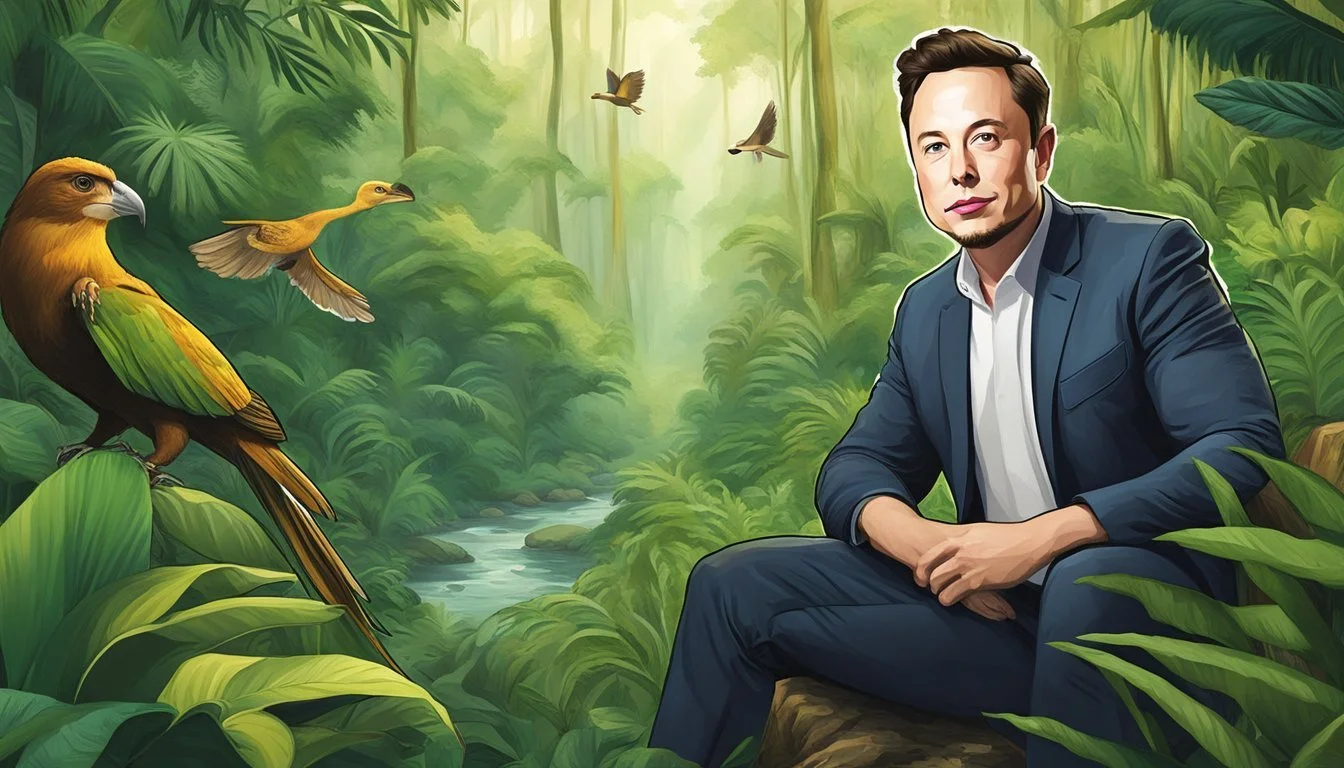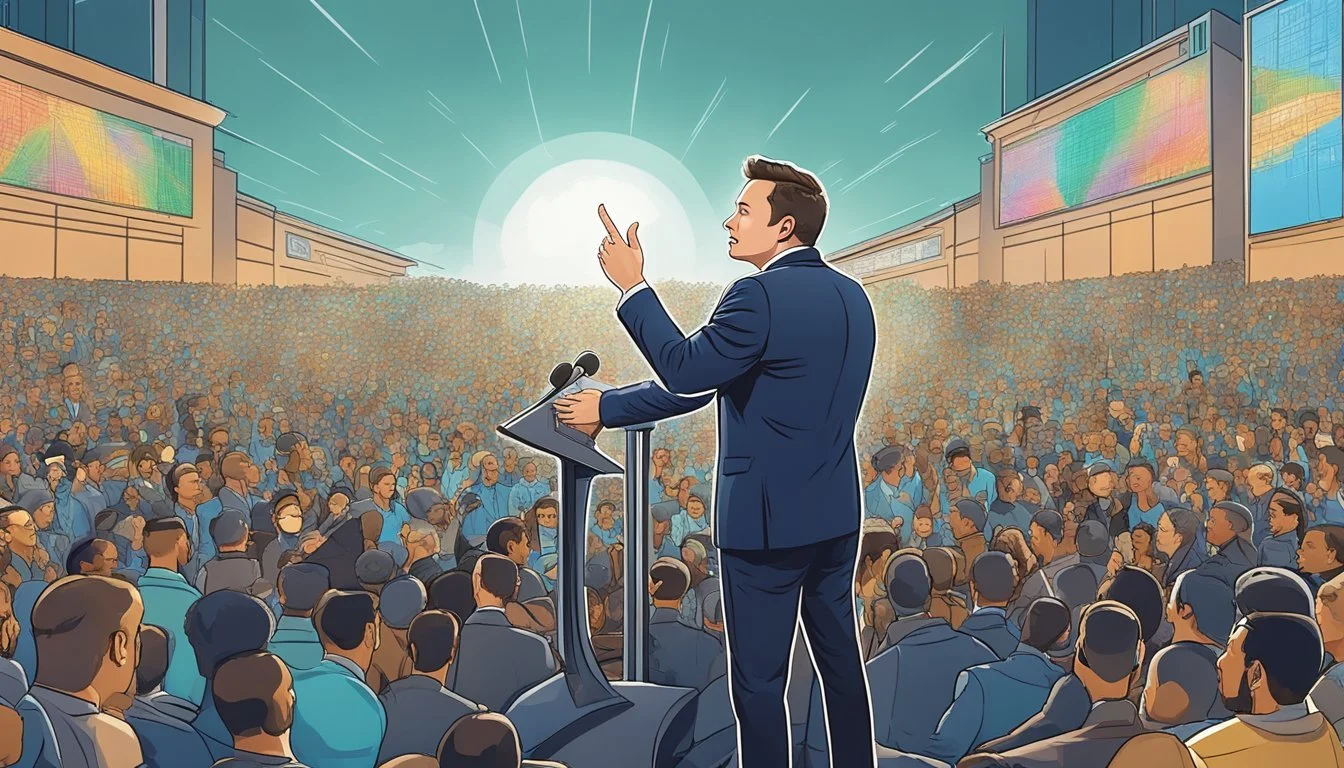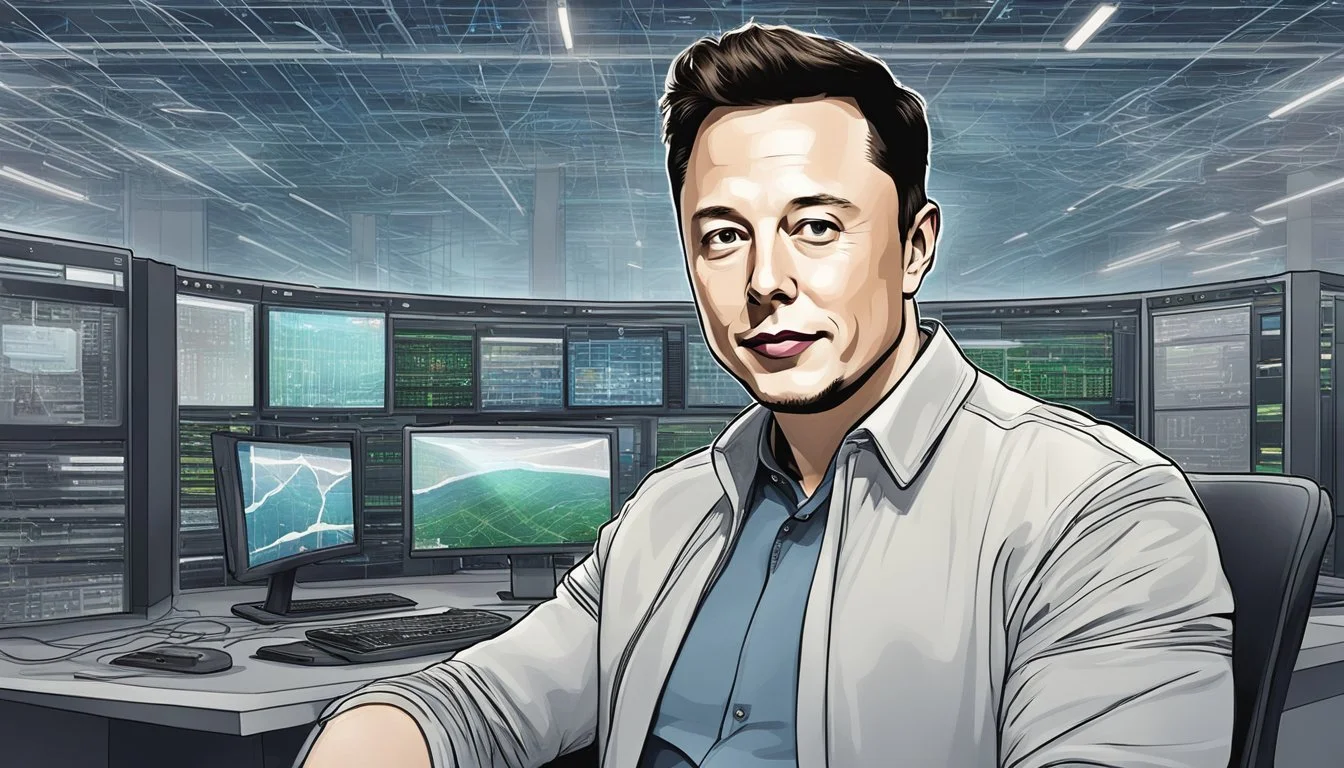Tech Billionaire Touches Down in South American Economic Powerhouse
Tech Mogul Explores Renewable Energy Opportunities
Elon Musk's clash with Brazil's Supreme Court has highlighted the complex relationship between tech giants and national governments. The billionaire entrepreneur found himself at odds with Brazilian authorities over content moderation on his social media platform X, formerly known as Twitter.
The conflict culminated in a temporary ban of X in Brazil from August 30 to October 8, 2024, affecting millions of users in one of the platform's largest markets. This unprecedented move came after Musk refused to comply with court orders to remove certain content and appoint a legal representative in the country.
The standoff between Musk and Brazilian Justice Alexandre de Moraes escalated when the tech mogul publicly criticized the judge, calling him names like "Brazil's Voldemort" and a "dictator." Eventually, X reversed course and began complying with court rulings, leading to the reinstatement of the platform in Brazil. This episode underscores the ongoing challenges tech companies face in balancing free speech with local laws and regulations.
Elon Musk's Endeavors in Brazil
Elon Musk's involvement in Brazil has focused on two key areas: infrastructure investment and satellite internet deployment. These initiatives aim to boost connectivity and economic development in the country.
Investment in Brazilian Infrastructure
Elon Musk has expressed interest in investing in Brazilian infrastructure projects. In 2022, he met with Brazilian President Jair Bolsonaro to discuss potential investments in the country's telecommunications and space sectors.
Musk proposed using Tesla's battery technology to help expand Brazil's renewable energy capacity. This could involve the installation of large-scale battery storage systems to complement the country's existing hydroelectric and solar power infrastructure.
The billionaire entrepreneur also explored opportunities to manufacture Tesla electric vehicles in Brazil. This move could create jobs and boost the country's automotive industry.
Starlink Satellite Internet Deployment
Musk's Starlink satellite internet service has made significant strides in Brazil. In 2022, the Brazilian government approved Starlink's operation in the country.
Starlink aims to provide high-speed internet access to remote and underserved areas of Brazil. The service uses a constellation of low Earth orbit satellites to deliver broadband connectivity.
The company has started rolling out its services in Brazil, focusing initially on rural and remote regions. This deployment could greatly improve internet access for millions of Brazilians who currently lack reliable connectivity.
Starlink's expansion in Brazil faces regulatory challenges and competition from existing telecom providers. However, the potential impact on Brazil's digital infrastructure remains substantial.
Political Engagement and Influence
Elon Musk has leveraged his tech platforms and personal status to engage with Brazilian politics. His actions have impacted political discourse and aligned him with certain figures in the country.
Engagement with Brazilian Officials
Musk's tweets have significantly influenced Brazil's political environment. He clashed with a Brazilian Supreme Court justice over free speech issues on X (formerly Twitter). This conflict centered on far-right accounts and misinformation concerns.
Musk's ability to shape political narratives through social media has drawn attention from Brazilian lawmakers and officials. His interventions have sparked debates about the role of tech platforms in national politics.
Support for Political Figures
Musk has shown support for specific Brazilian political figures. He aligned himself with right-wing elements in the country, particularly during discussions about online content moderation.
His interactions with former President Jair Bolsonaro garnered significant attention. Musk's stance on free speech resonated with Bolsonaro's supporters, who viewed content moderation as political persecution.
These actions raised questions about the impact of tech billionaires on Brazilian democracy. Critics argue Musk's involvement could sway political outcomes and public opinion in the country.
Legal Challenges and Compliance
Elon Musk's social media platform X faced significant legal hurdles in Brazil, culminating in court-ordered bans and fines. The company's initial resistance to comply with Brazilian authorities led to a complex legal battle with far-reaching consequences.
Supreme Court Investigations
Brazil's Supreme Court launched investigations into X for alleged spread of disinformation. The platform initially resisted court orders to block certain accounts. This defiance resulted in daily fines of 1 million reais ($197,000) and a temporary ban on X's operations in Brazil.
Musk publicly criticized the court's actions, accusing it of censorship. However, X eventually appointed a legal representative in Brazil and agreed to comply with all rulings from the Supreme Court and electoral authorities.
The company's compliance marked a significant shift in its stance and paved the way for the restoration of X's services in Latin America's largest economy.
Regulatory Hurdles with ANATEL
X also faced challenges with ANATEL, Brazil's telecommunications regulator. The platform needed to navigate complex regulatory requirements to operate legally in the country.
ANATEL demanded that X register as a formal telecommunications service provider. This requirement aimed to ensure the platform's adherence to local laws and regulations.
X's initial reluctance to comply with these demands further strained its relationship with Brazilian authorities. The company eventually worked towards meeting ANATEL's requirements to maintain its operational status in Brazil.
Freedom of Speech and Censorship
Elon Musk's clash with Brazilian authorities has sparked debates about free speech and censorship on social media platforms. The conflict centers on differing views of content moderation and government oversight.
Stance on Free Speech
Musk portrays himself as a "free speech absolutist" and champions unrestricted expression on X. He opposes content removal and account suspensions, viewing them as forms of censorship. Musk has criticized X's previous management for allegedly suppressing certain viewpoints. His acquisition of the platform was partly motivated by a desire to promote what he considers free speech principles.
X's policies under Musk have been more permissive regarding controversial content. This approach has led to tensions with governments and regulators concerned about misinformation and harmful speech.
Censorship Allegations and Reactions
The dispute in Brazil erupted when Musk publicly questioned Justice Alexandre de Moraes about "censorship" in the country. Musk objected to court orders demanding content removal and account restrictions on X. He viewed these actions as government overreach and threats to free expression.
Brazilian authorities defended the measures as necessary to combat disinformation and protect democratic institutions. The conflict escalated, with X briefly facing restrictions in Brazil.
The company later changed course, complying with court orders and seeking to lift the ban. This retreat highlighted the challenges of balancing Musk's free speech ideals with legal and operational realities in different countries.
Elon Musk's Interaction with Brazilian Media
Elon Musk's engagement with Brazilian media has been marked by controversy and legal challenges. His actions on social platforms have drawn attention from local and international press, sparking debates about free speech and regulation.
Coverage by Local and International News Outlets
Brazilian news outlets closely monitored Musk's clash with the country's Supreme Court. The Financial Times reported on the escalating tension between Musk and Justice Alexandre de Moraes. CNN highlighted Musk's defiant stance against court orders to ban certain X accounts.
Local media emphasized the potential consequences for X users in Brazil. International outlets like NPR focused on the broader implications for social media regulation. Live TV broadcasts in Brazil featured debates about the balance between free speech and combating misinformation.
Social Media Presence and Strategy
Musk's social media strategy in Brazil centered on X, formerly Twitter. He used the platform to directly challenge Brazilian authorities and criticize judicial decisions. Musk referred to Justice de Moraes as "Brazil's Voldemort" and "Brazil's Darth Vader" in provocative posts.
His confrontational approach led to increased scrutiny of X's operations in Brazil. Musk's refusal to comply with court orders resulted in threats to suspend the platform. This strategy risked alienating X's substantial Brazilian user base, estimated at 40 million people.
Musk's interactions sparked discussions about social media regulation in Brazil. His actions prompted calls from Brazil's attorney general for stricter controls on social media platforms operating in the country.
Combating Misinformation and Disinformation
The battle against false information in Brazil has intensified, with efforts targeting prominent figures and platforms. Social media's role in spreading misleading content has come under scrutiny, highlighting the need for robust countermeasures.
Efforts Against Fake News
Brazilian authorities have taken decisive action to combat fake news and disinformation. In March 2024, the Center for Combating Disinformation and Defense of Democracy was inaugurated in Brasilia. This initiative aims to tackle the spread of false information and protect democratic processes.
The Supreme Court has been at the forefront of these efforts. Justice Alexandre de Moraes has included Elon Musk in an ongoing investigation into the dissemination of fake news. This move came after Musk's platform X (formerly Twitter) allegedly failed to comply with court orders to remove certain accounts.
Brazilian officials have also implemented stricter regulations for social media platforms. These measures require companies to monitor and remove content deemed false or harmful.
Impact of Misinformation on Society
The spread of misinformation and disinformation has had significant consequences in Brazil. Far-right accounts have been accused of amplifying false narratives, potentially influencing public opinion and political discourse.
Hate speech and extremist content have become pressing concerns. Social media platforms have struggled to balance free speech with the need to curb harmful rhetoric.
The proliferation of fake news has eroded trust in institutions and media outlets. This has led to increased polarization and made it challenging for citizens to access reliable information.
To combat these issues, media literacy programs have been introduced in schools and communities. These initiatives aim to equip Brazilians with the skills to identify and critically evaluate online content.
Technology and Privacy Concerns
Elon Musk's clash with Brazilian authorities has highlighted key issues around digital privacy and data security. The conflict raises questions about government oversight of social media platforms and user protections.
Use of Virtual Private Networks
VPNs have become increasingly popular in Brazil amid concerns over online surveillance. These tools encrypt internet traffic, making it difficult for ISPs or other entities to monitor user activity. Some Brazilians turned to VPNs to access X (formerly Twitter) during the platform's temporary ban.
VPN usage surged in the country following the court order to block X. This allowed some users to circumvent the restrictions by routing their connections through servers in other countries. However, VPNs are not foolproof and can potentially be blocked by determined authorities.
Concerns Around Data Security
The dispute between Musk and Brazilian officials has spotlighted worries about data privacy on social media platforms. Users fear their personal information could be accessed by government agencies or other third parties without proper safeguards.
X's refusal to comply with certain court orders raised questions about how tech companies handle user data in different jurisdictions. Some worry that platforms may be compelled to share private user information with authorities.
Critics argue that overly broad content moderation powers could be abused to censor legitimate speech. Advocates call for clearer regulations to protect user privacy while addressing concerns about misinformation and illegal content online.
Business and Government Affairs
Elon Musk's ventures in Brazil involve complex interactions between his companies and government regulators. SpaceX's satellite internet plans and X's recent clash with Brazilian authorities highlight the challenges of operating in the country's business and regulatory landscape.
SpaceX's Role in Brazilian Connectivity
SpaceX aims to expand its Starlink satellite internet service in Brazil. The company sees potential in providing high-speed internet to remote areas of the country. SpaceX has been working to secure necessary approvals from Brazilian telecommunications regulators.
Starlink faces competition from existing internet service providers in Brazil. These companies have expressed concerns about the impact of satellite internet on their businesses.
SpaceX touts Starlink's ability to connect underserved regions quickly and cost-effectively. The company argues this technology could boost economic development in rural Brazil.
Government Stance on Satellite Internet Expansion
Brazilian officials have shown interest in SpaceX's satellite internet technology. They see it as a possible solution to bridge the digital divide in remote areas.
The government must balance potential benefits against concerns from traditional telecom companies. Regulators are carefully considering how to integrate satellite internet into existing telecommunications frameworks.
Some Brazilian lawmakers have called for safeguards to protect national interests. They want to ensure foreign companies like SpaceX comply with local laws and regulations.
The government is also weighing the economic impact of allowing new players into the market. Officials aim to foster innovation while protecting domestic industries.
Influence on Brazilian Culture and Society
Elon Musk's recent clash with Brazilian authorities has sparked intense debate and cultural ripples across the country. His actions and statements have become focal points for discussions on free speech, technology, and the role of social media in society.
Public's Perception of Elon Musk
Many Brazilians view Elon Musk as a polarizing figure. Some see him as a champion of free expression, likening him to a tech-savvy hero fighting against censorship. Others perceive him as a disruptive force challenging Brazilian law and democratic institutions.
His confrontation with Supreme Court Justice Alexandre de Moraes has drawn comparisons to fictional conflicts. Some liken Musk to Harry Potter, battling against what they see as oppressive authority. Critics, however, paint him as a Voldemort-like character, threatening the established order.
This divide has sparked heated debates on social media platforms and in public spaces across Brazil.
Cultural Impact and References
Musk's actions have seeped into Brazilian popular culture. Memes, jokes, and social media trends referencing the billionaire and his clash with Brazilian authorities have proliferated.
Artists and content creators have incorporated themes from this conflict into their work. Political cartoons featuring Musk have become common in newspapers and online publications.
The controversy has also inspired new slang terms and catchphrases in Brazilian Portuguese, reflecting the impact of global tech figures on local language and communication.
This cultural absorption demonstrates how international tech disputes can shape national discourse and creative expression in unexpected ways.







